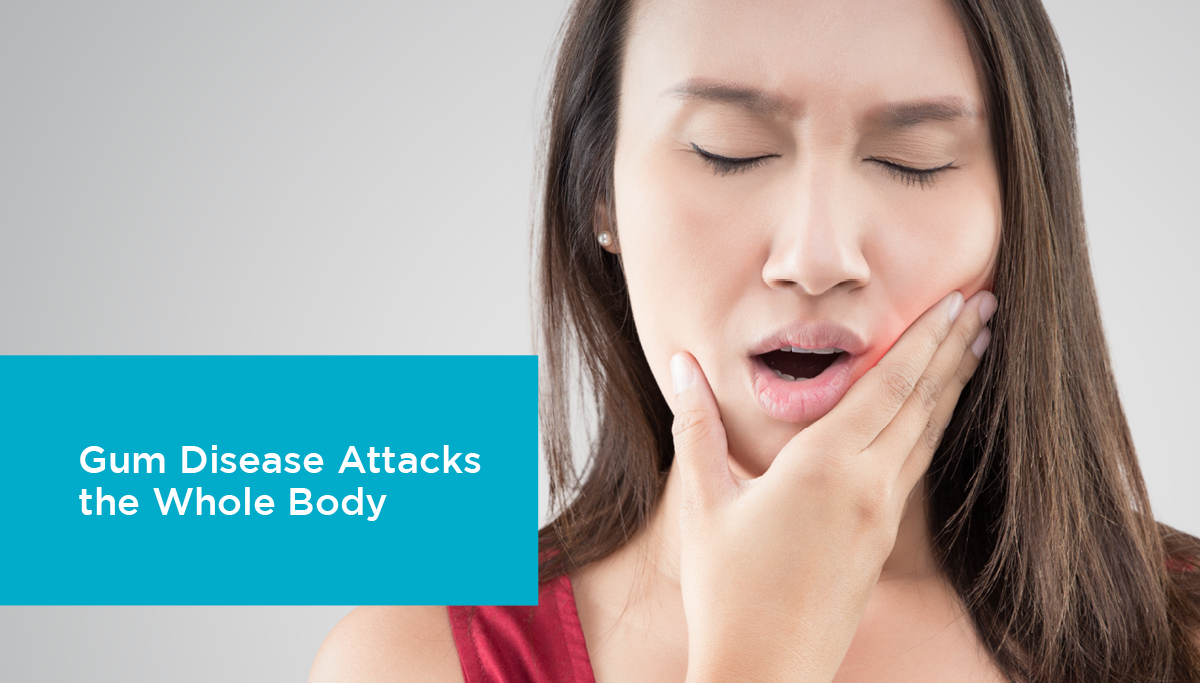Periodontal, gum disease attacks the whole body
In the past, many people separated the health of their mouths from the health of their bodies. Today, there is a better understanding of the connection between the two. You can’t have a healthy body with an unhealthy mouth.
Gum disease, also known as periodontal disease, is one example of an oral health problem that can affect the whole body. Without regular checkups at a dentist, you may not even know you have periodontal disease. It’s often a painless condition until it worsens, and chances are you have it. Nearly half of all US adults aged 30 or older have some form of periodontal disease.
Catching and treating gum disease early is important for your entire body. Keep reading to find out how this disease affects your overall health.
Gum disease and overall health problems
Gum disease has been linked to many serious types of medical conditions that can severely impact your overall health:
Gum disease and diabetes
People who have diabetes are at a much higher risk of developing gum disease compared to those who don’t have the condition, and gum disease is often considered a complication of diabetes. Gum disease causes gums to become inflamed, and inflammation in the body can lead to higher blood glucose, making it harder to manage diabetes.
Gum disease and heart disease
Gum disease is also linked to an increased risk of heart disease. Research suggests that inflammation in the body caused by gum disease can precede major cardiac events such as heart attacks and strokes. Another reason may be that bacteria from gum disease can travel through the bloodstream to the heart, which can infect heart valves. Although the link between the two is not fully understood, medical professionals agree that gum disease negatively impacts heart health.
Gum disease and osteoporosis
Osteoporosis is a medical disease in which bones become fragile and brittle. Osteoporosis is usually caused by aging, hormones, and calcium and vitamin D deficiency. However, studies have found that gum disease is also a risk factor. The inflammation caused by gum disease may impact bone homeostasis, or the creation of new bone, throughout the body. There are other mechanisms at play that scientists are working to better understand.
Gum disease and respiratory disease
Gum disease can impact your lungs and make existing lung problems worse. This is because bacteria can be inhaled and absorbed by the lungs through tiny saliva droplets. Once the bacteria reaches the lungs, an infection can occur, especially if the organs have previous damage.
Recently, it has been found that people with severe gum disease are more likely to have serious complications from COVID-19, including the need for a ventilator or having an increased risk of dying from the virus.
Gum disease and cancer
People with gum disease may have a higher risk of developing certain cancers, specifically cancers of the stomach and esophagus. According to a study from Harvard University, the bacteria from gum disease can negatively impact gut health. The observational study found that people with gum disease were 43 percent more likely to develop esophageal cancer and 52 percent more likely to develop stomach cancer compared to those with healthy gums.
Catching gum disease early is important for overall health
Here are some of the best ways to catch the disease:
Visit your dentist – Regular visits to your dentist are the best way to prevent and/or identify periodontal disease. During the checkup, they will check for gingivitis, which is an early form of periodontal disease. Your dentist will also help by cleaning your teeth and gums, effectively removing the plaque that causes gum disease in the first place.
Consider the symptoms – Do you have pain when chewing? Are you experiencing bad breath? Do your gums bleed after brushing your teeth or feel tender or puffy? You may have periodontal disease.
Pay attention to any changes in your mouth, like sudden pain when eating or a newly discovered loose tooth will help you gauge the state of your oral health. If you start to notice one or more of these symptoms persisting, it’s time to see your dentist.
Know your habits – People who rarely maintain their teeth and gums, those who smoke or chew tobacco, women who are pregnant, folks on certain medications, and many who have specific conditions like those mentioned above are at risk for periodontal disease.
How to prevent gum disease
Preventing gum disease is easy. Regular visits to the dentist, a proper oral care routine, and paying attention to your body are all that are required of you. If you suspect you have gum disease, it’s important to contact your dentist as soon as possible for an evaluation.
*Updated June 2023

